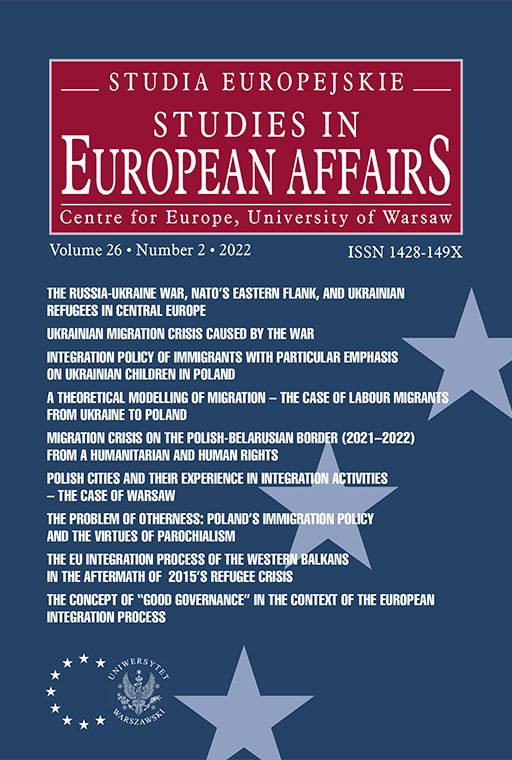
ISSUE: 2/2022
- Volume 26
- Number 2
- 2022
Subscribe NEWSLETTER
Studia Europejskie –
Studies in European Affairs
ISSN: 1428-149X
e-ISSN: 2719-3780
License
Articles published in the journal are under a Creative Commons Attribution – Non Commercial – No Derivatives 4.0 International License
The Concept of “Good Governance” in the Context of the European Integration Process
Abstract
There are many influential studies relating to the phenomenon of “good governance” in legal, economic or political dimensions. The major purpose of this paper is to present an interdisciplinary approach that attempts to integrate legal, economic, and political fields to analyse the indicated concept. This article aims at illustrating the interactions and interdependences between “good governance” and the school of law and economics, especially within the European Integration process, founded on the said principles. Apart from legal and economic issues, the indicated areas form a specific field of politics which should be perceived through the prism of political science. The economic approach requires focusing attention on the process of profit maximisation, however, one should not ignore the element of classical political disputes. The hypothesis of this article is the following statement: the decomposition of the liberal idea of law and economy may translate into a downturn of the European supranational structures, leading to the modifi cation of institutions relying on the principles of “good governance”.
References
Alexandrakis, C. and Jones, R. (2006) Secession and exit: an analysis of two competing hypotheses in Ott A.F., Cebula R.J. (eds.) The Elgar companion to public economics: empirical public economics. Cheltenham: Edward Elgar Publishing, pp. 388–402. DOI: https://doi.org/10.4337/9781845424558.00036.
Baier, S. and Bergstrand, J. (2004) “Economic determinants of free trade agreements”, Journal of International Economics. Vol. 64(1), pp. 29–63. DOI: https://doi.org/10.1016/S0022-1996(03)00079-5.
Berglund, S. (2006) “Prison or voluntary cooperation? The possibility of withdrawal from the European Union”, Scandinavian Political Science. Vol. 26(2), pp. 147–167. DOI: https://doi.org/10.1111/j.1467-9477.2006.00147.x.
Berniak-Woźny, J. (2017) “Good governance – narzędzie czy fundament zrównoważonego rozwoju?”, Zeszyty Naukowe Uczelni Vistula. Vol. 55(4), pp. 5–16.
Bookmann, M. (1992) The economics of secession. New York: St. Martin’s Press. DOI: https://doi.org/10.1007/978-1-137-07984-8_4.
Börzel, T. (2018) “Researching the EU (Studies) into Demise?”, Journal of European Public Policy. Vol. 25(3), pp. 475–485. DOI: https://doi.org/10.1080/13501763.2017.1411385.
Brożek, B., Stelmach, J. and Załuski, W. (2017) Dziesięć wykładów o ekonomii prawa. Warszawa: Wolters Kluwer Polska.
Cooter, R. and Ulen, T. (2011) Ekonomiczna analiza prawa. Warszawa: C.H. Beck.
Ikenberry, J. (2018) “The End of Liberal International Order?”, International Affairs. Vol. 94(1), pp. 7–23. DOI: https://doi.org/10.1093/ia/iix241.
Jones, E. (2018) “Towards a Theory of Disintegration”, Journal of European Public Policy. Vol. 25(3), pp. 440–451. DOI: https://doi.org/10.1080/13501763.2017.1411381.
Kurrild-Klitgaard, P. (2002) “Opting-out: The constitutional economics of exit”, American Journal of Economics and Sociology. Vol. 61(1), pp. 123–158. DOI: https://doi.org/10.1111/1536-7150.00154.
Martin, L. and Simmons, B. (2013) International Organizations and Institutions in Carlsnaes W., Risse T. and Simmons B. (eds.) Handbook of International Relations. Oxford, pp. 192–211. DOI: https://doi.org/10.4135/9781446247587.n13.
Pawłowska, A. (2016) “Governance jako podejście teoretyczne – kilka kwestii spornych”, Polityka i Społeczeństwo. Vol. 3(14), pp. 5–17. DOI:https://doi.org/10.15584/polispol.2016.3.1
Pepinsky, T. (2017) Dis-Embedding Liberal. Available at: https://papers.ssrn.com/sol3/papers.cfm?abstract_id=3054001 (Access 30.12.2021).
Rutkowski, M. (2009) “Bank Światowy a poprawianie jakości rządzenia w zmieniającym się świecie. Sytuacja Polski i wyzwania kryzysu gospodarczego”, Zarządzanie Publiczne. Vol. 3(9), pp. 69–79.
Schneider, G. and Cederman L.-E. (1994) “The change of tide in political cooperation: a limited information model of European Integration”, International Organization. Vol. 48(4), pp. 633–662. DOI: https://doi.org/10.1017/S0020818300028332.
Vollaard, H. (2014) “Explaining European Disintegration”, JCMS: Journal of Common Market Studies. Vol. 52(5), pp. 1142–1159. DOI: https://doi.org/10.1111/jcms.12132.
Webber, D. (2014) “How Likely Is It That The European Union Will Disintegrate? A Critical Analysis of Competing Theoretical Perspectives”, European Journal of International Relations. Vol. 20(2), pp. 341–365. DOI: https://doi.org/10.1177/1354066112461286.
Wegner-Kowalska, J. (2017) Idea pragmatyzmu w postępowaniu administracyjnym in Zimmermann J. (ed.) Aksjologia prawa administracyjnego, Warszawa: Wolters Kluwer, pp. 965–976.
Wilkin, J. (2014) Kategoria jakości rządzenia w naukach społecznych – zagadnienia metodologiczne in Wilkin J. (ed.) Jakość rządzenia w Polsce. Jak ją badać, monitorować i poprawiać?, Warszawa: Wydawnictwo Naukowe Scholar, pp. 19–39.
Zirk-Sadowski, M. (2011) Wprowadzenie do filozofi i prawa. Warszawa: Wolters Kluwer, pp. 111–119.
DOI: 10.33067/SE.2.2022.9
Language: English
Pages: 141-152
How to Cite:
Harvard
Niedźwiecki, A. (2022) "The Concept of “Good Governance” in the Context of the European Integration Process". Studia Europejskie – Studies in European Affairs, 2/2022, pp. 141-152. DOI: 10.33067/SE.2.2022.9